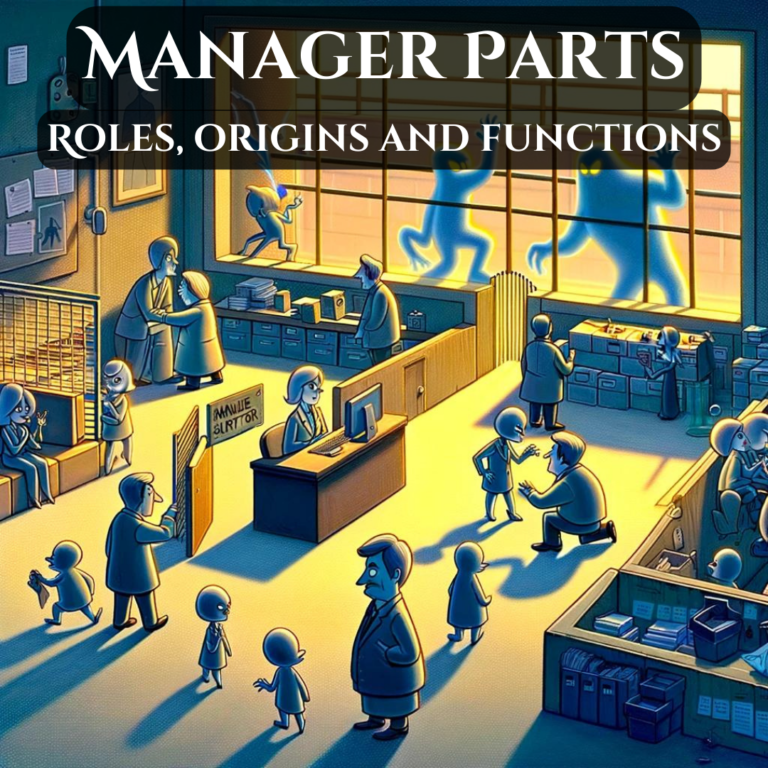Unveiling Manager Parts in IFS: Roles, Origins and Fuctions
In the Internal Family Systems (IFS) framework, Managers are pivotal parts that proactively maintain our psychological ecosystem. Understanding their roles, how they originated, and their functions can illuminate much about our daily behaviors and emotional responses. This post delves deeper into these aspects to provide a comprehensive understanding of Managers within IFS.
Managers play a crucial role within our internal system, acting as the first line of defense against emotional disturbances. By preemptively managing psychological processes, they ensure our mental and emotional stability.
- Preventative Protectors: Managers are parts that preemptively manage our life to avoid psychological pain. Their primary role is to maintain control over our mental environment to prevent activation of Exiles, thus keeping vulnerability and distress at bay.
- Maintenance of Normalcy: They orchestrate our psychological state to ensure that we appear normal and function effectively in our daily roles, often through enforcing productivity, perfectionism, and routine.

The Role of Protector Parts:
Protector parts in IFS, much like guard dogs, serve to defend against emotional pain that could overwhelm our system. These parts include Managers, who maintain day-to-day mental functioning by preempting emotional distress, and Firefighters, who respond when emotional pain breaks through our defenses. Before we can safely address the Exiles—parts that are burdened with pain and trauma—we must understand and gain the trust of these protective parts.
Where do Manager Parts come from?
The formation of Manager parts is a response to environmental demands and personal experiences, shaping their protective behaviors and strategies.
- Formation in Response to Stress: Managers often develop in response to family dynamics, social expectations, or personal traumas that require a child or individual to adapt quickly to maintain safety or acceptance.
- Evolution Over Time: Initially formed to protect, Managers evolve by reinforcing behaviors that shield the individual from harm, criticism, or failure. These behaviors, over time, become entrenched as automatic responses to stress or threats.
Functions and Challenges of Manager Parts
The FUNCTION of Managers are varied and complex, primarily focusing on emotional and social regulation to protect the self from potential disruptions.
- Emotional Regulation: Managers attempt to regulate emotional responses to keep potentially disruptive emotions under control. This can include suppressing anger, anxiety, or sadness that might otherwise overwhelm the individual’s ability to function.
- Social Facilitation: By managing how emotions are expressed, Managers help individuals navigate social interactions more effectively. They encourage behaviors that are deemed socially acceptable and discourage those that are not.
Despite their protective intentions, Managers can sometimes overextend their roles, leading to CHALLENGES that affect personal growth and internal harmony.
- Overcontrol and Rigidity: While Managers help in maintaining stability, their methods can sometimes become too controlling, leading to rigidity in behavior and thought processes. This can stifle creativity and prevent authentic emotional expression.
- Conflict with Other Parts: Managers often come into conflict with more spontaneous or vulnerable parts, like Firefighters and Exiles, creating internal discord and imbalances that can manifest as inner turmoil or external relationship issues.
Wrapping it up...
Understanding Managers gives us insight into the complexities of how we protect ourselves from psychological pain. It allows us to appreciate why we might resist change or struggle with flexibility, pointing towards paths for growth and greater self-awareness.
🍃 Reflect on the ways Managers operate in your life. What protective behaviors do they encourage, and how do they shape your interactions and responses? Share your thoughts and engage in a dialogue about the intricate roles of Managers in our internal systems.
